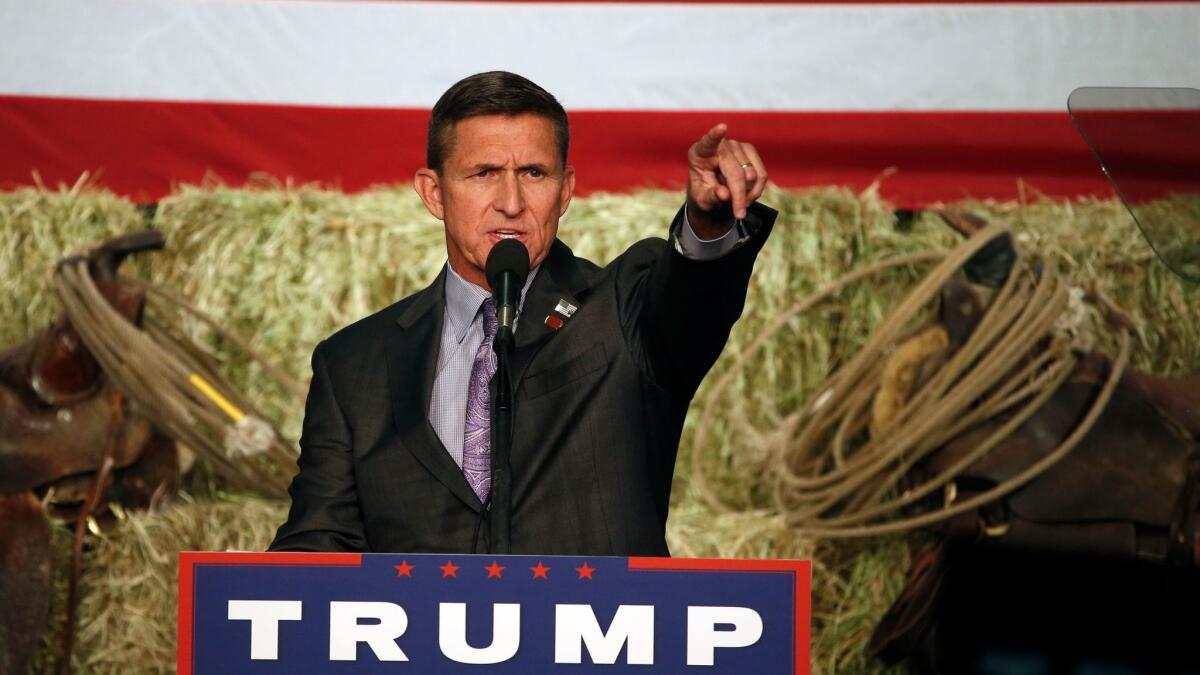Editorial: Good riddance to Michael Flynn, a fear monger who was wrong for the job long before his Russian antics

- Share via
There is only one sensible reaction to the resignation of retired Lt. Gen. Michael Flynn as President Trump’s national security advisor: Good riddance — and not merely because Flynn was caught in what looks like a lie.
Flynn had to go after admitting that he had “inadvertently” misled Vice President-elect Mike Pence and others about his conversations with Russia’s ambassador to the United States in the final days of the Obama administration. Relying on assurances from Flynn, Pence told a national TV audience on Jan. 15 that Flynn and the Russian diplomat didn’t discuss “anything having to do with” the sanctions President Obama had imposed on Russia for interfering in the American presidential election. Well, it turns out they did. (In his resignation letter, Flynn said he provided “incomplete information” to his superiors about his phone calls with the ambassador. He later admitted to the Daily Caller that he had discussed one particular penalty, Obama’s expulsion of 35 Russian diplomats.)
But Flynn’s departure is also good news because he was as volatile a presence in the administration as he was in the Trump campaign, where he is remembered for inciting delegates at the Republican National Convention in their anti-Hillary Clinton chants. “Yeah, that’s right,” Flynn said. “Lock her up.” Not unlike the president who appointed him, Flynn engaged in stereotyping of Muslims, at one point tweeting a YouTube video listing bombings committed by Muslims with the title “Fear of Muslims is RATIONAL.” His brief tenure as national security advisor will be remembered most for a bellicose appearance at a White House news briefing at which he put Iran “on notice” — a vague but worrisome warning. Flynn was a rash and reckless hothead unsuited to a position of such tremendous responsibility.
The Justice Department knew the truth about Flynn’s exchange with the Russian ambassador because the FBI routinely monitors the ambassador’s communications — something Flynn, a former director of the Defense Intelligence Agency, should have realized. In late January, days into the new Trump administration, the acting U.S. attorney general and a key intelligence official informed the White House counsel that Flynn’s denial didn’t match the evidence and expressed a concern that Flynn might be vulnerable to blackmail by Russia.
The White House contended on Tuesday that Trump acted decisively after the Justice Department raised concerns about Flynn’s misrepresentations — although it was a slow-motion, several-weeks-long sort of decisiveness. In the end, White House Press Secretary Sean Spicer said, Trump asked for Flynn’s resignation not because of any illegality or even impropriety in his actions but rather because of “trust” issues. So if Flynn hadn’t dissembled on the subject, Trump wouldn’t have minded if he had talked substance with the Russians? He wouldn’t have minded that Flynn floated the idea of lifting at least some of the sanctions that had been imposed on Russia for interfering in the election on Trump’s behalf? Those are troubling thoughts.
Nor should the White House have the last word on whether Flynn’s conversations with the Russian ambassador were legal or appropriate.
A 1799 federal statute known as the Logan Act makes it a felony for a private citizen to negotiate with a foreign government. Sally Yates, the acting attorney general in late January, alerted the White House about Flynn’s misrepresentation of his conversation partly because she believed he was in potential violation of the Logan Act. Granted, the law is basically a dead letter; otherwise prominent figures who have negotiated for the release of American hostages held overseas over the years might have ended up in prison. Still, it’s the Justice Department, not the White House, that is responsible for assessing criminal responsibility. And Flynn’s conversations with the ambassador potentially could be of interest to an FBI investigation of Russian efforts to influence the election.
Flynn also must be scrutinized by the House and Senate intelligence committees, which are investigating not only Russian hacking operations but relationships between Moscow and people associated with the 2016 presidential campaign. Looking into exchanges between Russia and the Trump transition would be a natural extension of that mandate. Republican Sen. Roy Blunt of Missouri, a member of the Senate Intelligence Committee, said Tuesday that “we should look into it exhaustively so that at the end of this process nobody wonders whether there was a stone left unturned.”
Flynn is the first major casualty in an administration that has careened from one tempest to the next -- picking ridiculous fights with the media; offending and then making nice with leaders of China, Mexico and Australia; flubbing the rollout of a temporary ban on entry from seven mostly Muslim nations before the courts put it on hold; undermining its own agenda with startling tweets and discursive forays into petty beefs. And it comes at a time when Trump’s foreign policy team is in disarray, led by a businessman with no diplomatic experience and riven with dissent from the ranks. Even with all that, some additional uncertainty is an acceptable price to pay for replacing a loose cannon like Michael Flynn.
Follow the Opinion section on Twitter @latimesopinion and Facebook
UPDATES:
2/15: This editorial was updated with new information and additional editing.
More to Read
A cure for the common opinion
Get thought-provoking perspectives with our weekly newsletter.
You may occasionally receive promotional content from the Los Angeles Times.






